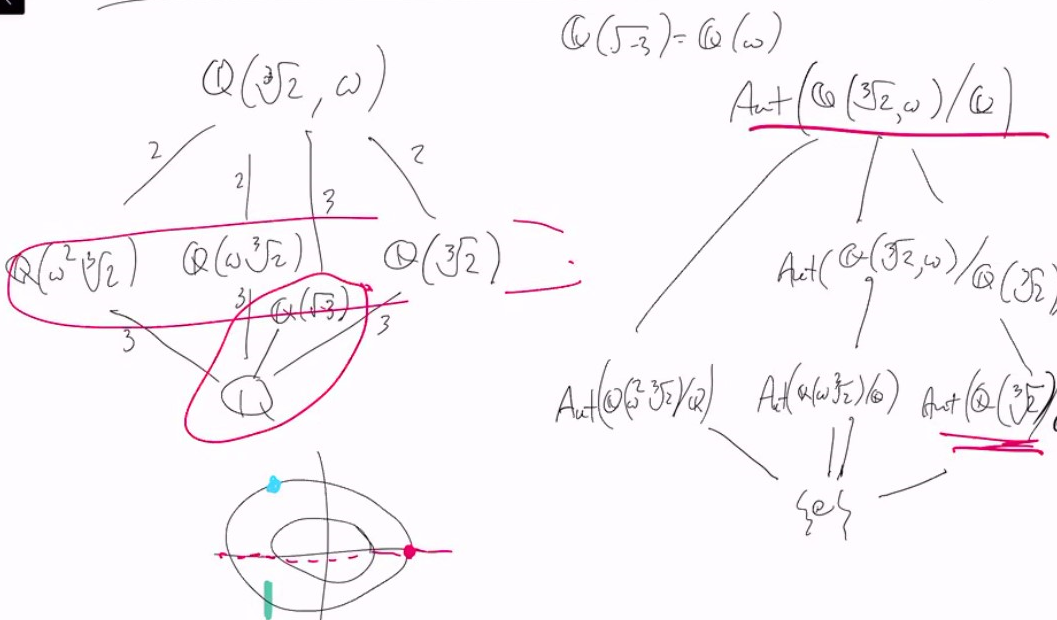Final lecture note of MAT347 Winter 2021.
Galois Theory
- If $K/F$ is a field extension
- $\langle Aut(K), \circ \rangle$ is the group of automorphism (field homomorphism)
Definition: $Aut(K/F)$
- $\langle Aut(K), \circ \rangle$ is the group of automorphism (field homomorphism)
- $Aut(K/F)$ is a subgroup of those automorphism that fix $F$
- i.e. $\sigma x = x \quad \forall x \in F$
- For any $K, F$, $id \in Aut(K/F)$ ***
- $\Complex / R$ where $z \mapsto \overline{z}$ fixed $R$
- so conjugation is an element of $Aut(\Complex/R)$ ***
- Prime Field in $K$ is generated by $1$
- if $\sigma \in Aut(K), \sigma 1 = 1$
- thus $\sigma$ fixed the prime field
- Thus $Aut(K) = Aut(K/K_{prime})$
***
Prop:
- Suppose $K/F$ and $a \in K$ is algebraic over $F$
- if $\sigma \in Aut(K/F)$
- then $\sigma a$ is a root of $\min_{a,F}(x)$
- which is $g \in F[x]$ s.t. $g(a) = 0$
- then $\sigma a$ is a root of $\min_{a,F}(x)$
- if $\sigma \in Aut(K/F)$
- An example is $x^2 + 1 = 0$ has conjugated roots
- the reason is that you can apply $\sigma$ to it and by homomorphism you can see that ***
- If we live in a ground field $F$,
- $f\in F[x]$ if $f(a) = 0$ then $f(\sigma a) = 0$
- you cannot easily distinguish by using language like $f$
- using term from lower field
Prop:
- using term from lower field
- you cannot easily distinguish by using language like $f$
- $f\in F[x]$ if $f(a) = 0$ then $f(\sigma a) = 0$
- Suppose $H \subseteq Aut(K)$
- Define $F_H = {x \in K : \sigma x = x \quad \forall \sigma \in H}$
- then $F_H$ is a subfield of $K$
- $F_H$ is the fixed field of $H$ ***
- then $F_H$ is a subfield of $K$
- Define $F_H = {x \in K : \sigma x = x \quad \forall \sigma \in H}$
- If $F$ is a subfield of $K$ is a subfield
- then we can associate $Aut(K/F)$ to $F$
Galois Theory: Association between Subgroup of $Aut(K)$ and subfields of $K$
- then we can associate $Aut(K/F)$ to $F$
- Easy : reverses inclusions: smaller fields corresponds to bigger subgroup
Prop:
- Suppose $E$ is the splitting field of $f(x) \in F[x]$ (contains all the roots of $f$)
- then $|Aut(E/F)| \le [E : F]$
- $|Aut(E/F)| = [E:F] \iff f(x)$ is separable (can become linear factors, splits completely $E$) (???)
- separable : its roots are distinct in an algebraic closure of K, that is, the number of distinct roots is equal to the degree of the polynomial
- only one issue in character = p
- proof: $F(a) \mapsto F(\sigma a)$ will be extends to $E \mapsto E$
Definition: Galois Extension
- A finite extension $K/F$ is galois (A Galois Extension) iff $Aut(K/F) = [K:F]$
- In that case $Aut(K/F)$ is called Galois Group of $K/F$
- Example:
- $\Complex/R$ where $\sigma : z \mapsto \overline{z}$
- $Aut(\Complex/R) = Gal(\Complex/R) = {e, \sigma}$
- $[\Complex : R] = 2 = |Aut(\Complex / R)|$
- $Q[\sqrt{d}]/Q$ is of degree 2
- then $Aut(Q(\sqrt{d}/Q)) = {e, x+\sqrt{d} \mapsto x - y \sqrt{d}}$ ***
- $\Complex/R$ where $\sigma : z \mapsto \overline{z}$
- Example: Galois Theory

- there are some Galois Extension inside the picture
- normal extension ~normal subgroup
- quotient on the normal subgroup ~ galois group
- section 14 ***
- $f(x) \in F[x]$
- if take $a^{\frac{1}{m}}$, we will have an extension $a^{\frac{1}{m}}$
- cyclic extension on galois group

- requiring galois group is a solvable group
- $S_2,S_3, S_4$ are solvable, but $S_5$ is not
- but “most” of 5-th power has $S_5$ as Galois Group
- if take $a^{\frac{1}{m}}$, we will have an extension $a^{\frac{1}{m}}$
- Legend says Galois finish all these in one night